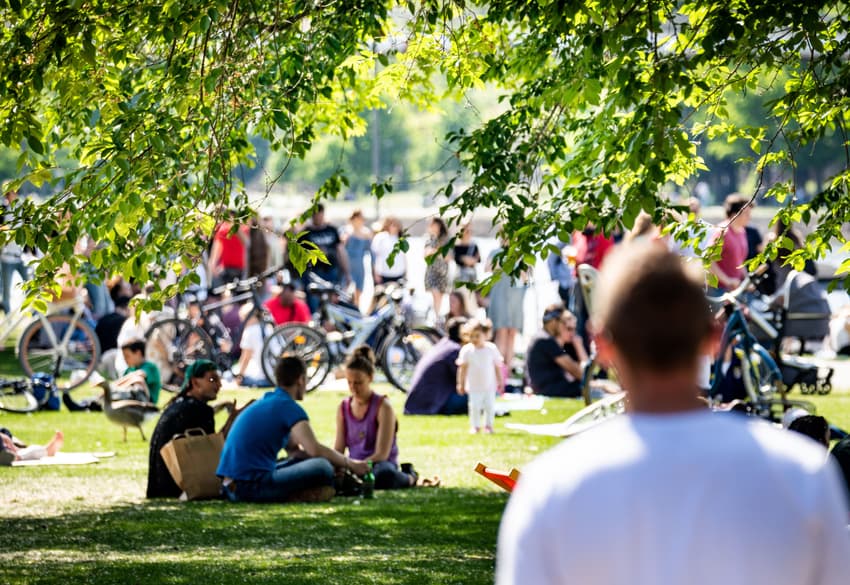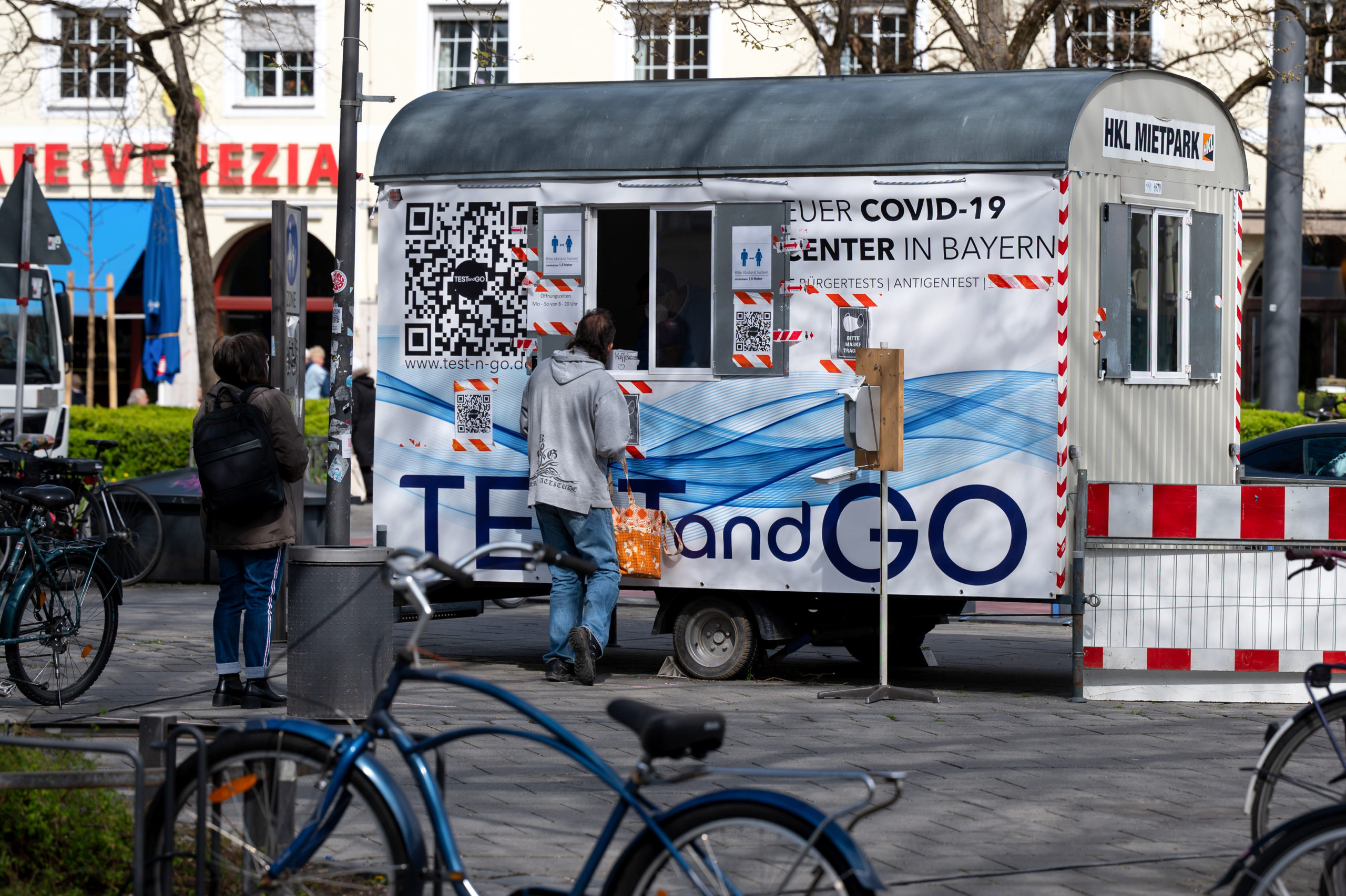Five things to know about the Covid pandemic in Germany right now

As the weather warms up and tourism returns to Germany, this spring feels more normal than the last two years. So what is the pandemic situation in Germany - and how will it develop?
Covid cases falling - but lots of unreported infections
The number of Covid infections in Germany has been falling recently, according to official figures. On Tuesday, 107,568 Covid infections were logged within the latest 24 hour period, as well as 218 deaths. The 7-day incidence fell to 522.7 infections per 100,000 people.
The Robert Koch Institute's weekly report from May 5th stated: "The peak of the current wave has clearly been passed, many hospitalisation indicators and and deaths continue to decrease."
But experts warned that "the infection pressure remains high with almost 600,000 Covid-19 cases transmitted to the RKI within the last week".
It's worth keeping in mind that many cases of Covid are going unreported.
Johannes Nießen, chairman of the Federal Association of Public Health Service Physicians, told Tagesschau: "Many rapid tests are not confirmed by PCR testing. And since only PCR testing is included in the incidence-value calculation, we assume that the incidence value is at least twice as high as reported."
READ ALSO: Germany reports no Covid deaths: What does it mean?
Changes to testing
There was a time a few months ago when you had to queue for a long time to get a Covid test in Germany. But after the testing priorities changed (with a focus on PCR testing for key workers and vulnerable groups) and Covid restrictions were eased, test stations became quieter.
And at the end of May, there will be another key change - government-funded Schnelltests will no longer be free to the public. So it won't be possible to run to your nearest test station to check on your infection status if you think you have Covid. You'll either need to buy a self-test or pay for a test at the centre.

A pop-up Covid testing station in Münich. Photo: picture alliance/dpa | Sven Hoppe
... but there are still Covid restrictions in place
The so-called 3G and 2G rules - meaning people had to show some kind of proof to enter a venue like a restaurant - are no longer in place across Germany.
Mask rules were also relaxed around the beginning of April.
But people in Germany still have to wear a Covid mask on public transport as well as long-distance trains and planes. They also remain in places where there are lots of vulnerable people such as hospitals, care homes and shelters for the homeless.
Some independent businesses and organisations can, however, ask visitors to wear a mask or take a test.
Covid isolation rules are still in place but they have changed, too.
Now people who get a positive Covid test have to isolate for at least five days. They have the possibility to end it after five days if they haven't had symptoms for 48 hours, or with a negative test (depending on the state rules). If symptoms or positive test results persist, isolation can last a maximum of 10 days.
READ ALSO: Germany sets out new Covid isolation rules
Reinfections on the rise
It is unclear exactly how many people have been infected more than once. But figures from the Baden-Württemberg state health office show that cases of reinfection are increasing. In December 2021, the share of reinfections in the south-west state stood at 0.5 percent, and in April it rose to 3.6 percent. However, these are only the numbers that have been reported.
Experts say the reason for the increase in reinfections since the beginning of the year is the Omicron variant. Virologist Martin Stürmer told Tagesschau: "In the beginning, we had the variants Alpha to Delta. The variants were so similar that the antibodies continued to provide good protection against infection or reinfection after vaccination or infection.
"With the Omicron variant, however, the virus has changed so much that this is no longer the case, so that reinfections occur more frequently despite vaccination, boosting or recovery status."
However, Stürmer said vaccination does protect against severe illness.
Within the Omicron variant, reinfection with the BA.2 sub-variant after an infection with BA.1 is rare, according to Stürmer.
Although Omicron has been shown to cause less severe illness in the population in general, 'long Covid' - where symptoms persist for a longer period of time - is still a concern and something experts in Germany are watching closely.
What about new variants?
Experts are urging people to be aware that new variants could emerge in the current climate.
Stürmer said it's important to keep in mind that "by allowing a lot of infection, we also allow the emergence of new variants, because basically the mutation rate is higher if we allow a lot of infection".
"The virus changes," he added, "and it may be that at some point there will be another variant that challenges us more."
Health Minister Karl Lauterbach said in April that he expected the pandemic situation to be more relaxed in the summer. But he warned of possible waves and future variants in autumn.
Comments
See Also
Covid cases falling - but lots of unreported infections
The number of Covid infections in Germany has been falling recently, according to official figures. On Tuesday, 107,568 Covid infections were logged within the latest 24 hour period, as well as 218 deaths. The 7-day incidence fell to 522.7 infections per 100,000 people.
The Robert Koch Institute's weekly report from May 5th stated: "The peak of the current wave has clearly been passed, many hospitalisation indicators and and deaths continue to decrease."
But experts warned that "the infection pressure remains high with almost 600,000 Covid-19 cases transmitted to the RKI within the last week".
It's worth keeping in mind that many cases of Covid are going unreported.
Johannes Nießen, chairman of the Federal Association of Public Health Service Physicians, told Tagesschau: "Many rapid tests are not confirmed by PCR testing. And since only PCR testing is included in the incidence-value calculation, we assume that the incidence value is at least twice as high as reported."
READ ALSO: Germany reports no Covid deaths: What does it mean?
Changes to testing
There was a time a few months ago when you had to queue for a long time to get a Covid test in Germany. But after the testing priorities changed (with a focus on PCR testing for key workers and vulnerable groups) and Covid restrictions were eased, test stations became quieter.
And at the end of May, there will be another key change - government-funded Schnelltests will no longer be free to the public. So it won't be possible to run to your nearest test station to check on your infection status if you think you have Covid. You'll either need to buy a self-test or pay for a test at the centre.

... but there are still Covid restrictions in place
The so-called 3G and 2G rules - meaning people had to show some kind of proof to enter a venue like a restaurant - are no longer in place across Germany.
Mask rules were also relaxed around the beginning of April.
But people in Germany still have to wear a Covid mask on public transport as well as long-distance trains and planes. They also remain in places where there are lots of vulnerable people such as hospitals, care homes and shelters for the homeless.
Some independent businesses and organisations can, however, ask visitors to wear a mask or take a test.
Covid isolation rules are still in place but they have changed, too.
Now people who get a positive Covid test have to isolate for at least five days. They have the possibility to end it after five days if they haven't had symptoms for 48 hours, or with a negative test (depending on the state rules). If symptoms or positive test results persist, isolation can last a maximum of 10 days.
READ ALSO: Germany sets out new Covid isolation rules
Reinfections on the rise
It is unclear exactly how many people have been infected more than once. But figures from the Baden-Württemberg state health office show that cases of reinfection are increasing. In December 2021, the share of reinfections in the south-west state stood at 0.5 percent, and in April it rose to 3.6 percent. However, these are only the numbers that have been reported.
Experts say the reason for the increase in reinfections since the beginning of the year is the Omicron variant. Virologist Martin Stürmer told Tagesschau: "In the beginning, we had the variants Alpha to Delta. The variants were so similar that the antibodies continued to provide good protection against infection or reinfection after vaccination or infection.
"With the Omicron variant, however, the virus has changed so much that this is no longer the case, so that reinfections occur more frequently despite vaccination, boosting or recovery status."
However, Stürmer said vaccination does protect against severe illness.
Within the Omicron variant, reinfection with the BA.2 sub-variant after an infection with BA.1 is rare, according to Stürmer.
Although Omicron has been shown to cause less severe illness in the population in general, 'long Covid' - where symptoms persist for a longer period of time - is still a concern and something experts in Germany are watching closely.
What about new variants?
Experts are urging people to be aware that new variants could emerge in the current climate.
Stürmer said it's important to keep in mind that "by allowing a lot of infection, we also allow the emergence of new variants, because basically the mutation rate is higher if we allow a lot of infection".
"The virus changes," he added, "and it may be that at some point there will be another variant that challenges us more."
Health Minister Karl Lauterbach said in April that he expected the pandemic situation to be more relaxed in the summer. But he warned of possible waves and future variants in autumn.
Join the conversation in our comments section below. Share your own views and experience and if you have a question or suggestion for our journalists then email us at [email protected].
Please keep comments civil, constructive and on topic – and make sure to read our terms of use before getting involved.
Please log in here to leave a comment.